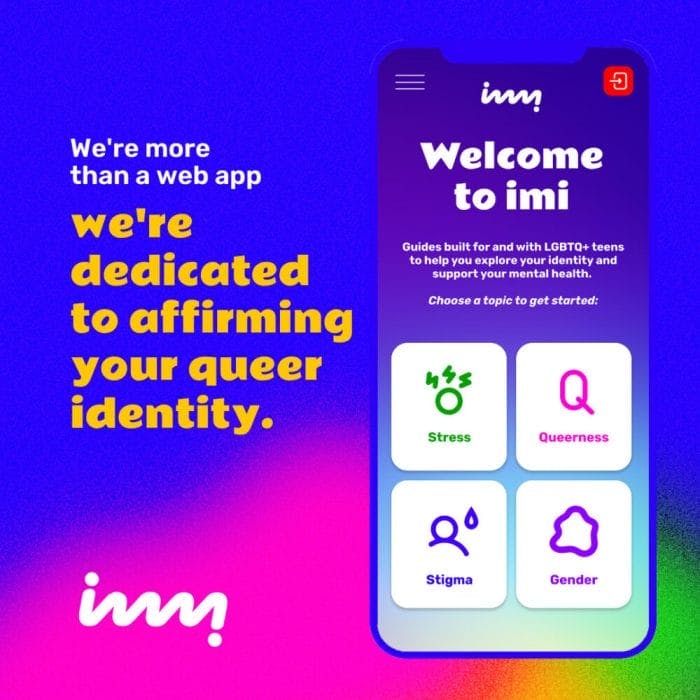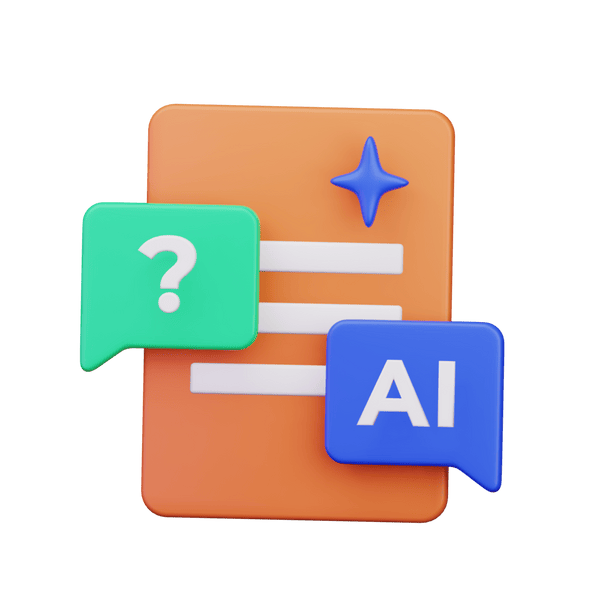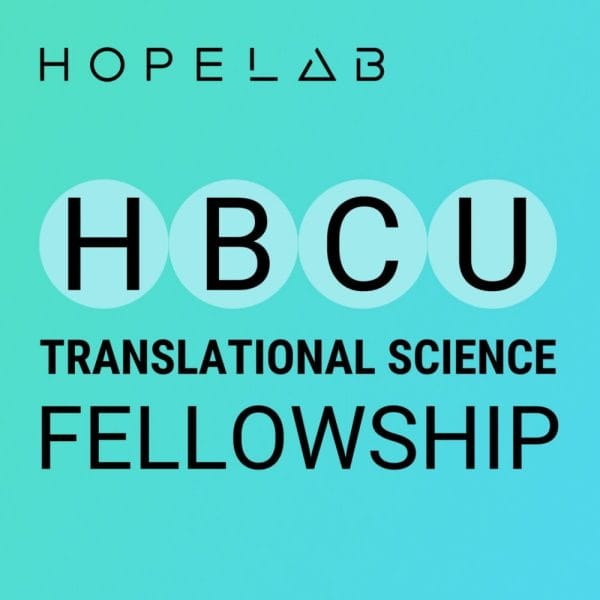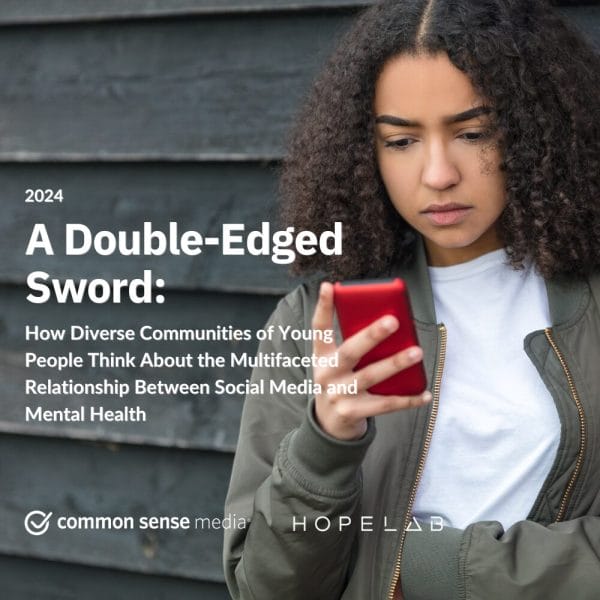Contact:
Shania Genwright
shania.genwright@evokegroup.com
610-732-7403
imi Launched in Response to LGBTQ+ Teen Demands for Digital Safe Space to Support Identity Exploration and Affirmation
Free, research-backed mental health tool helps LGBTQ+ youth cope with stress through practical, relevant, and inclusive approaches
- imi (pronounced eye-me) helps LGBTQ+ youth explore and affirm their identity and learn practical approaches to cope with sexual and gender minority stress in ways that are supportive, relevant, inclusive, and joyful.
- imi, made for and with LGBTQ+ teens, breaks down important topics like stress, LGBTQ+ identity, internalized stigma, and gender identity and expression through interactive resources, stories, and activities.
- imi was evaluated in a randomized controlled trial by researchers at the University of Pennsylvania, as detailed in a preprint manuscript currently under peer review.
San Francisco, June 1, 2022 – Hopelab, in collaboration with CenterLink and the It Gets Better Project, announced today the release of imi (pronounced eye-me), a free, digital mental health tool designed to support LGBTQ+ youth explore and affirm their identity. Designed with and for LGBTQ+ teens, with an intentional focus on BIPOC (Black, Indigenous, and People of Color), transgender, non-binary, and gender nonconforming youth, imi provides relevant and practical approaches to boost positive coping skills and mindsets that support LGBTQ+ youth mental well-being. imi is available for free; easily accessible from any device with a web browser and internet connection at imi.guide.
Identity-affirming resources are vital to the well-being of sexual and gender minority youth (SGMY)1. Alarming data continues to shed light on the influence of the COVID-19 pandemic on LGBTQ+ youth suicidality, and now more than 300 anti-transgender and anti-LGBTQ+ bills have been introduced across nearly 40 states – further exacerbating healthcare disparities and directly impacting LGBTQ+ youth2. imi responds to the need for safe, accessible, and research-backed support for LGBTQ+ youth within the digital health ecosystem, delivering freely available resources and activities that focus on topics like stress, LGBTQ+ identity, internalized stigma, and gender identity and expression.
“Queer youth deserve an inclusive and just world where they can express themselves without judgment, harassment, or discrimination,” said Deborah Levine, (she/her), director of LGBT YouthLink at CenterLink. “Until that world exists, we must provide support to LGBTQ+ youth, especially BIPOC teens, with accessible tools and resources that affirm and support their identities.”
A broad and diverse group of young people supported the co-creation of imi through a collaborative design process guided by Hopelab. Notably, Hopelab intentionally focused on BIPOC, transgender, non-binary, and gender nonconforming youth during the research, design, and development process to ensure the final product is inclusive. imi’s research-based guides feature the lived experiences of LGBTQ+ teens through videos, audio recordings, artwork, and affirmations, that support LGBTQ+ teens with diverse and intersectional identities.
“The development of imi was only possible with the input and perspectives of LGBTQ+ teens. Co-creation with young people is an essential ingredient for making mental health and well-being interventions more accessible and engaging,” said Margaret Laws, President and CEO of Hopelab. “imi is really a multi-sector collaboration that will help move the needle on equitable health outcomes.”
imi was tested through a randomized controlled trial conducted by researchers at Hopelab and the University of Pennsylvania’s Program on Sexuality, Technology, and Action Research (PSTAR). Of the 270 teens who participated in the trial, 78% identified as BIPOC, and 60% identified as transgender and/or gender expansive, genderqueer, or gender nonconforming. Initial data, detailed in a preprint manuscript (under peer review), posted in May, indicates that imi is effective in supporting the well-being of LGBTQ+ youth. A diverse group of LGBTQ+ youth randomly assigned to receive imi reported significantly greater improvements in coping skills, and significantly greater confidence in their ability to cope than youth randomly assigned to receive a web-based list of freely available resources for LGBTQ+ youth. These results suggest that imi may play an important role in helping LGBTQ+ teens cope with stress.
“Even in a best-case scenario, when a young queer person has access to a supportive community, there are still obstacles they face in finding the resources they need to inform their gender and sexual development,” said Brian Wenke, Executive Director of the It Gets Better Project. “We hope that imi can help fill this knowledge gap with an experience that encourages LGBTQ+ teens to explore who they are without fear of judgment or persecution. The It Gets Better Project proudly endorses any platform that has the potential to inspire a young queer person to pursue and embrace their greatest potential. We believe imi can play an important role in that journey.”
imi is not a social platform or a crisis tool – it is intended as a resource for LGBTQ+ teens to help affirm their identity and learn practical ways to cope with stress and stigma. If in crisis, the following resources are available for support: TrevorLifeline, TrevorChat, TrevorText, Trans Lifeline, Crisis Text Line, and/or the National Suicide Prevention Lifeline. A “quick exit” button is also included for users who need to discreetly leave the tool when feeling unsafe or judged in their surroundings.
imi is available for free, June 1, 2022 at imi.guide.
To learn more about the data peer reviewed and presented at the 2022 Association for Psychological Science Conference, see the preprint here.
About Hopelab
Hopelab is a social innovation lab and impact investor advancing entrepreneurs, research, digital health, and solutions that support and empower young people, especially those from historically underserved communities. The organization works to remove systemic barriers to youth mental health and emotional well-being through targeted social impact investments, hands-on design and research support for digital innovation, and translational science partnerships. Learn more at hopelab.org.
About CenterLink
CenterLink was founded in 1994 as a member-based coalition to support the development of strong, sustainable, LGBTQ community centers. The organization strengthens, supports, and connects LGBTQ community centers. A fundamental goal of CenterLink’s work is to help build the capacity of these centers to address the social, cultural, health, and advocacy needs of LGBTQ community members across the country. With over 300 members, CenterLink continues to play a vital role in addressing the challenges centers face by helping them to improve their organizational and service delivery capacity, access public resources, and engage their regional communities in grassroots social justice movements. Learn more at www.lgbtcenters.org
About It Gets Better Project
It Gets Better Project is a 501(c)3 nonprofit organization that strives to uplift, empower and connect LGBTQ+ youth around the globe. Created in 2010 as the result of one of the most successful viral video campaigns in YouTube’s history, the It Gets Better Project provides critical support and hope to LGBTQ+ youth around the world by leveraging the power of media to reach millions of people each year. The project has expanded its origins in storytelling and media to include educational resources through It Gets Better EDU and reaches 19 countries outside of the U.S. through It Gets Better Global.The project has garnered support from President Joe Biden, former President Barack Obama, and former Secretary of State Hillary Clinton, along with numerous celebrities, including Kelly Clarkson, Gabrielle Union, Zachary Quinto, Mj Rodriguez, Josie Totah, and Gigi Gorgeous. More than 750,000 people have taken the It Gets Better pledge to share messages of hope and speak up against intolerance. Learn more at www.itgetsbetter.org
Citations
[1] https://2022survey.thetrevorproject.org/assets/static/trevor01_2022survey_final.pdf
###





